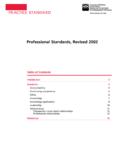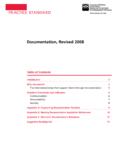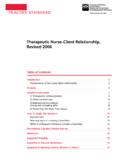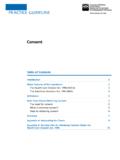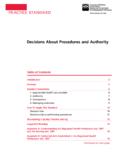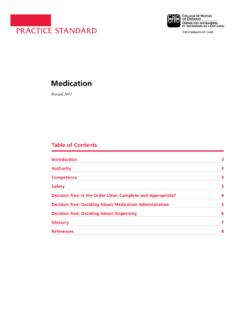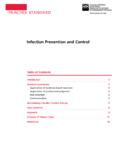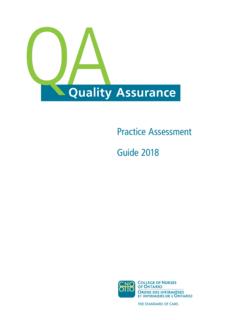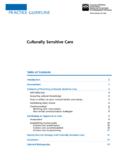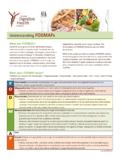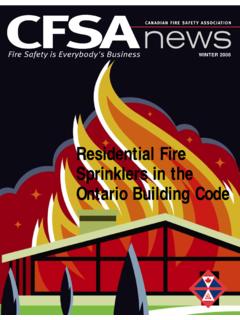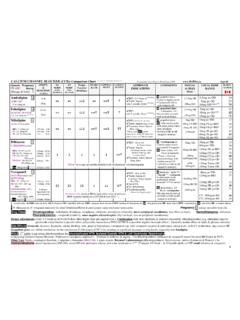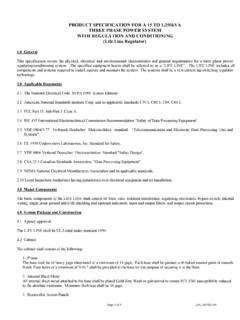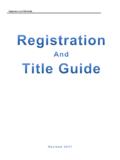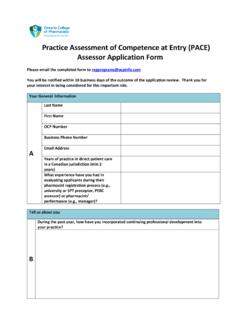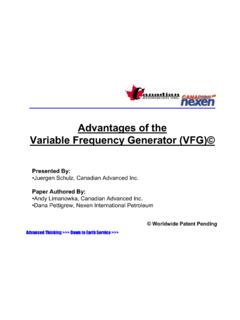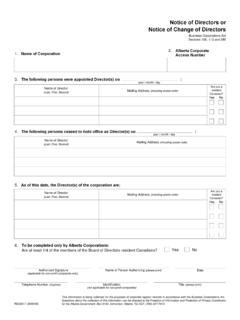Transcription of Competencies Entry-to-Practice for Registered Nurses
1 Competenciesfor entry-level Registered Nurse practiceRevised Jan. 2014 AcknowledgmentsThe College of Nurses of Ontario would like to thank CNO members who participated in the review and revision of this document. The College also recognizes and thanks the Jurisdictional Collaborative Process committee for the foundational work on entry-level of Contents Introduction 3 Purpose of the document 3 Document background 3 Guiding principles 4 Definition of competency 4 Conceptual framework 4 Professional responsibility and accountability 5 Knowledge-based practice 6 Specialized Body of Knowledge 6 Competent application of knowledge 7 Ethical practice 9 Service to the public 9 Self-regulation 10 Glossary of terms 11 References 13 College of Nurses of Ontario Competencies for entry-level Registered Nurse practice2
2 Competencies for entry-level Registered Nurse practice Pub. No. 41037 ISBN 978-1-77116-009-4 Copyright College of Nurses of Ontario, or for-profit redistribution of this document in part or in whole is prohibited except with the written consent of CNO. This document may be reproduced in part or in whole for personal or educational use without permission, provided that: Due diligence is exercised in ensuring the accuracy of the materials reproduced; CNO is identified as the source; and The reproduction is not represented as an official version of the materials reproduced, nor as having been made in affiliation with, or with the endorsement of, Published March 1999 as Entry to Practice Competencies For Ontario Registered Nurses as of January 1, 2005, Updated June 2005, Revised February 2007. Revised June 2008 from the Jurisdictional Competency Process: Entry-level Registered Nurses . Revised February 2009 as National Competencies in the context of entry-level Registering Nurse practice.
3 Adopted for Ontario Registered Nurses Entry-to-Practice copies of this booklet may be obtained by contacting CNO s Customer Service Centre at 416 928-0900 or toll-free in Ontario at 1 800 of Nurses of Ontario 101 Davenport Rd. Toronto ON M5R of Nurses of Ontario Competencies for entry-level Registered Nurse practice3 IntroductionThe College of Nurses of Ontario is the regulatory body for nursing in Ontario. Through provincial government legislation (the Nursing Act, 1991 and Regulated Health Professions Act, 1991), the College is accountable for public protection by ensuring that Nurses in Ontario are safe, competent and ethical practitioners. The College fulfills its mandate through a variety of regulatory activities including registration; maintaining standards of nursing practice and education; enforcement of nursing standards; conducting continuing competence reviews; and establishing Competencies that are required for nursing document outlines the Competencies expected of Registered Nurses , upon entry and ongoing registration with the College.
4 An entry-level Registered nurse is one who has graduated from an approved baccalaureate nursing education program and is registering with the College for the first time. As such, these Competencies serve as the criteria against which entry-level Registered Nurses are measured upon initial registration with the College and entry to practice in Ontario. The Competencies are also used to guide the assessment of members continuing competence for maintaining registration with the of the documentThe Competencies for entry-level Registered nurse practice are established for the following purposes:Protection of the Public: Through government legislation (Regulated Health Professions Act, 1991), the College is mandated by the public to promote and ensure safe, competent and ethical Nurses in Reference: The Competencies are used as a reference or resource to assist Registered Nurses to understand entry-level practice expectations and ongoing application within their professional of Nursing Education Programs: The Competencies are used by the College in the evaluation of baccalaureate nursing education programs to ensure that the curriculum prepares graduates to successfully achieve professional practice standards upon entry to and Membership Requirements.
5 The Competencies are used by the College to inform registration eligibility Reference: The legal definition of nursing practice included in the Nursing Act, 1991 establishes the basis for the scope of practice in which all Nurses may engage. The Competencies are the expectations for Registered Nurses upon entry to practice in Ontario, and are used as a reference when evaluating the standard of care of Registered Information: The Competencies inform the public, employers, and other health care providers about Registered nursing practice, and assist with accurate expectations for Registered nursing practice at the entry Competence: In accordance with the College s Quality Assurance Program, the Competencies are used by members in the annual self-assessment of their nursing practice and development of professional learning backgroundThe entry-level Competencies for Registered Nurses were first published by the College in 2005 to align with the regulation change towards a university baccalaureate education requirement for Registered Nurses in Ontario.
6 Since then, the Competencies have been revised by means of the Jurisdictional Collaborative Project (JCP), as represented by 10 provincial and territorial nursing regulatory bodies across Canada, whose aim is to: enhance jurisdictional consistencies in entry-level Competencies for Registered Nurses that is based on a common Competencies framework utilize the Competencies framework to support the Mutual Recognition Agreement about reciprocity of Registered nurse registration within Canada ensure that the entry-level Competencies are evidence-informed and ref lect new developments in society, health care, nursing knowledge and current best initial framework development and revision process used by the JCP are published in Competencies in the Context of Entry-Level Registered Nurse Practice: A Collaborative Project in Canada (Black et al., 2008). Using the results College of Nurses of Ontario Competencies for entry-level Registered Nurse practice4of environmental scanning, literature reviews and simultaneous stakeholder consultation within each jurisdiction, the JCP conducted their most recent review and revision of the entry-level Competencies for Registered Nurses in 2012.
7 These revisions provide the foundation for revisions to this College document so as to fall in alignment with the multi-jurisdictional work of the JCP, thus aligning the competency expectations of entry-level Registered Nurses with other Canadian nursing principlesThe Competencies for the entry-level Registered nurse are based on the following guiding principles:1. Requisite skills and abilities are required to successfully attain the entry-level Registered nurse Competencies . Such requisite skills and abilities are outlined in the College document titled Requisite Skills and Abilities for Nursing Practice in Ontario. 2. Entry-level Registered Nurses have a strong foundation in nursing theory, concepts and knowledge, health and sciences, humanities, research, and Entry-level Registered Nurses are prepared at the university baccalaureate education level as generalists to enter into practice safely, competently and ethically: in situations of health and illness with people of all genders and across the lifespan in a variety of practice settings with clients who are defined as individuals, families, groups, communities and populations4.
8 Competencies of the entry-level Registered nurse are applicable across all practice settings. 5. Entry-level Registered Nurses are expected to practise in a manner consistent with provincial and federal legislation that directs nursing practice, in addition to the College s standards for professional practice and Entry-level Registered Nurses are responsible for critical reflection and assessment of their practice in relation to their ability to meet the Competencies , including obtaining the necessary education in order to attain and maintain Entry-level Registered Nurses actively engage in interprofessional collaborative practice essential for improvement in client health Entry-level Registered Nurses are practitioners whose level of practice, autonomy and proficiency grow through collaboration, mentoring and support from Registered nurse colleagues, leadership and the interprofessional health care of competencyA competency is defined as the knowledge, skill.
9 Ability and judgment required for safe and ethical nursing practice. The Competencies outlined in this document frame the entry-level practice expectations of the Registered nurse. These Competencies are not tasks, but are behavioural actions that require the Registered nurse to utilize a depth and breadth of knowledge, skill and judgment that allow them to safely practise and competently adapt to changes in the health care environment. Please note that anywhere in the document where examples are provided for a competency, it is intended to mean including, but not limited to the examples frameworkThe Competencies are organized into a conceptual framework from a regulatory perspective that depicts five broad competency categories that are expected of entry-level practice for Registered Nurses . These competency categories are interrelated, as illustrated in Figure 1, and include, Professional Responsibility and Accountability, Knowledge-Based Practice, Ethical Practice, Service to the Public and Self-RegulationSafe and ethical Registered nursing practice requires the assessment, integration and performance of many Competencies at the same time.
10 It is also dependant on the specific practice context and client needs for which the Competencies are to be applied. Hence, the client is central to the conceptual framework. In this document, the client is defined as the recipient of nursing services and includes the individual, family, group, community or population. The number of Competencies under each competency category, and the order in which they are presented, is not an indication of priority or importance. College of Nurses of Ontario Competencies for entry-level Registered Nurse practice5 Figure 1: Conceptual framework for Organizing CompetenciesProfessional responsibility and accountability Consistently demonstrates professional conduct in accordance with the College s standards for nursing practice and ethics; and that the primary duty is to the client to ensure safe, competent, ethical nursing entry-level Registered nurse:1. Demonstrates accountability and acceptance of responsibility for one s own actions and Recognizes individual competence within legislated scope of practice and seeks support and assistance as necessary.
